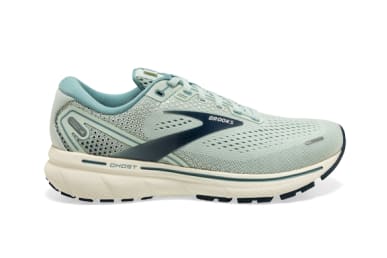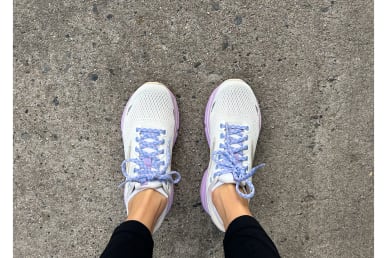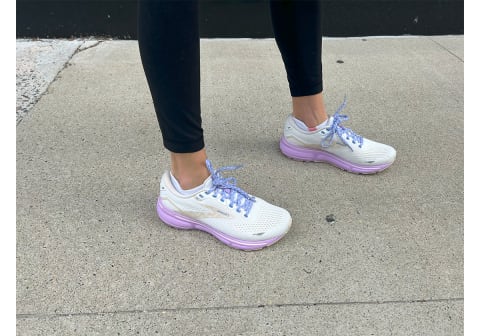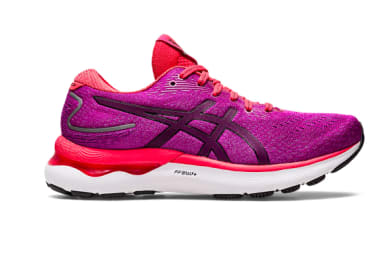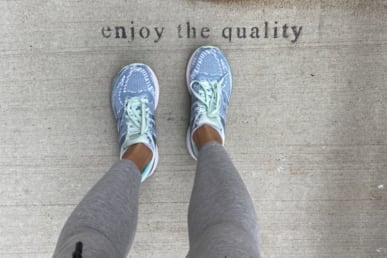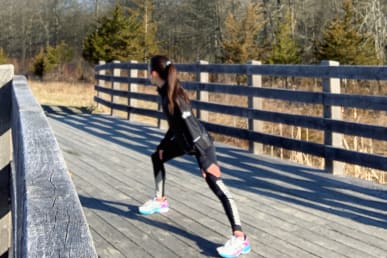Advertisement
ASICS vs. Brooks Running Shoe Comparison, From A Marathoner


As a long-distance runner who writes about fitness products for a living, I’ve tested a lot of running shoes (and become a harsh sneaker critic). I was once monogamously devoted to my ASICS Gel Nimbus (three marathons strong!), but a recent tryst with the cloud-like Brooks Ghost left me wavering.
Here's everything you need to know in the battle of Brooks vs Asics. Plus, my top recommendations from each brand after testing out a few different styles.
Don't forget!
About the tester
- Name: Carleigh Ferrante
- Age: 35
- Foot type: Narrow, neutral arches, and bunions
- Activity level: Active
- Running experience: Four major world marathons
My testing process
I live a very active lifestyle, so I'm able to test sneakers extensively without much change to my routine.
I've worn the ASICS Gel Nimbus sneakers for over a decade, thoroughly testing many iterations including the most current Gel Nimbus 26. I've run three world major marathons in different ASICS Gel Nimbus models, and hundreds of miles worth of training runs.
To give the Brooks Ghost 15 a fair chance for comparison, I swapped out my existing running shoes for a full six weeks. During this testing period, I wore the Brooks Ghost 15 for four to five runs per week on a variety of surfaces (track, trail, road, and treadmill) for a range of distances (100-meter sprints to 10-mile long runs).
What is Brooks?
Brooks is a Seattle-based sportswear company making high-performance sneakers, clothing, and accessories. The brand’s designs are known for their cloud-like comfort, stability, and support, with a number of styles to choose from.
Aside from the immense cushioning, one thing that stands out about Brooks is the GuideRails technology, which the brand uses in its designs to help stabilize the foot and improve alignment between the knee and ankle for reduced risk of injury.
A few designs have the APMA Seal of Acceptance (indicating that the shoes promote good foot health), and podiatrists have recommended the Brooks designs to mindbodygreen for running, walking, and everyday wear.
"Brooks focuses on biomechanics and offers shoes with excellent support and stability, particularly beneficial for those with overpronation or other gait issues," says podiatrist Dina Gohil, DPM.
My experience testing Brooks
Pros & Cons
Pros & Cons
Pros
Cloud-like, floaty feel
Very smooth transitions
Carbon Neutral
APMA seal of acceptance
Cons
Cushioning in the forefront is a bit light
The Ghost 15 were my first foray into testing Brooks sneakers myself, but podiatrists have been praising them for years.
Sharkey previously told me the Ghost 15 are specifically great for those with high arches or wide feet, and podiatrist and founder of Dr. Brenner's RX, Hillary Brenner, DPM, added that they're among her top-recommended shoes for runners seeking a neutral shoe.
I spent six weeks testing the Brooks Ghost 15—and I was shocked by how supported I felt by these cloud-like, floaty sneakers. I wore them after a bit of an extended break from running, and they made what would have been a tough run feel surprisingly easy.
Over the course of six weeks, these shoes kept my feet supported and comfortable during more than 25 outdoor and indoor runs. They even passed my 10-mile run test straight out of the box without any break-in required.
Another perk? The Brooks Ghost 15 is made with 67.3% recycled materials in the upper and is certified Carbon Neutral.
Best for: Runners with high arches, wide feet, or bunions, treadmill runs, road running.
What is ASICS?
Originating in Japan, ASICS is a multinational sportswear company known for running sneakers (although it also makes footwear for other sports and lifestyle activities, along with clothing and accessories).
Similar to Brooks, a number of ASICS designs have earned the podiatric APMA Seal of Acceptance, and countless podiatrists have recommended the brand to me for a variety of foot types and use cases.
Holistic podiatrist Robert Kornfeld, DPM, previously recommended the ASICS Gel Nimbus shoes for runners of all experience levels, and they also come highly recommended by Gohil.
ASICS uses a GEL technology in its cushioning which Gohil says provides excellent shock absorption and comfort. And in recent years the brand has made more efforts toward sustainability, with recycled materials in most of the designs.
My experience wearing ASICS
Pros & Cons
Pros & Cons
Pros
Very breathable materials
Thick cushioning
Great traction
Cons
Sizing runs slightly small
The Gel Nimbus is designed for people with a neutral stride or underpronation. It has neutral support and maximum cushioning (about the same amount as the Kayano), made from the same FF BLAST™ PLUS ECO material.
Even after more than 10 years of running in the Gel Nimbus, I'm still always impressed by how lightweight they feel. I'd expect a shoe with this thick of a cushion to be heavy on my feet, but I've worn mine comfortably for dozens of long training runs in the New York summer heat.
I love wearing these shoes for long runs, but they've also performed well for countless sprints and interval training. Plus, they kept me comfortable and supported during three marathons.
The gripped outsole provides great traction for road running, while also adding to the shoe's durability—and mine really do hold up well over time. I replace them like clockwork every 400 to 500 miles, per podiatrist recommendations.
Countless podiatrists have recommended this versatile shoe to us, and we even named it one of the best running shoes of 2024. Plus, I love knowing that at least 75% of the shoe's upper is made with recycled content.
Best for: Runners with bunions, runners who need arch support, road running.
Comparing ASICS vs. Brooks
| Product | Price | Drop | Weight | Sizes | Colorways |
|---|---|---|---|---|---|
| Asics Gel Nimbus | $160 | 8mm | 9 oz. | 5-13; half sizes; wide sizes | 12 |
| Brooks Ghost | $140 | 12mm | 9.1 oz. | 5-13; half sizes; wide sizes; narrow sizes | 30 |
ASICS vs. Brooks: Comparing the cost
Our verdict: Brooks
No matter how you slice it, running shoes are expensive—but it's an investment in so many areas of your health. Well-made sneakers will keep your feet and your body healthy, and you'll be able to safely and comfortable reap the many benefits of running.
ASICS vs. Brooks: Comparing the sustainability
Our verdict: ASICS
At the end of the day, the footwear industry is notoriously responsible for a lot of waste, and (while there's still a ways to go) I do like seeing that both brands are making strikes toward more sustainable, eco-friendly designs.
ASICS vs. Brooks: Comparing the comfort
Our verdict: Brooks
While I still hold an allegiance to the ASICS Gel Nimbus, I can't deny how unbelievably comfortable the Brooks Ghost sneakers are. They're the most cloud-like running shoes I've ever tested, and maintain their floaty feeling even during 10+ mile runs.
ASICS vs. Brooks: Comparing the cushioning
Both ASICS and Brooks sneakers have fairly thick cushioning, and the show with the lowest drop on our list is the ASICS Gel Nimbus at 8mm. But the key difference is in the materials used for the cushioning.
ASICS uses its signature GEL technology, which is slightly heavier than a typical foam and does not feel quite as springy, but has incredible shock absorption.
Brooks has a few types of cushioning in its shoes, but most often you’ll find the DNA Loft cushioning, which is made from a blend of rubber, EVA foam, and air. This material is very springy and fairly lightweight.
There's no saying which one is better, because it really just depends on each runner's preference and needs.
ASICS vs. Brooks: Comparing the fit
Fit is very subjective, so there's no true winner in this category—but I have been fairly surprised by how differently the two brands fit on my feet. I have bunions and have always been able to wear the ASICS Gel Nimbus comfortably, but once I compared the design with the Brooks Ghost 15 I noticed that ASICS shoes can actually be quite narrow.
Brooks sneakers definitely have a wider toe box, and the whole shoe is on the wider side. Because of this, I’d recommend Brooks designs for runners with wide feet or bunions.
On the other hand, ASICS sneakers tend to have a narrow, snug fit, which is nice for people with narrow feet or who prefer a more secure feel.
How to choose between ASICS & Brooks
When it comes to choosing the best running shoes, you should first consider your budget, how often you'll be running, and the surface you'll be running on. You'll also want to keep in mind any existing foot conditions, such as bunions, plantar fasciitis, or flat feet.
If you're not sure what type of running shoe is best for you, it can be extremely helpful to visit a specialized running store and complete a gait analysis. Experts will watch you run, measure your feet, and give personalized recommendations.
"Overall, the choice between ASICS and Brooks depends on individual preferences and specific needs," Gohil agrees. "If cushioning and shock absorption are top priorities, ASICS might be the better option—and if stability and support are more critical, Brooks could be the preferred choice."
